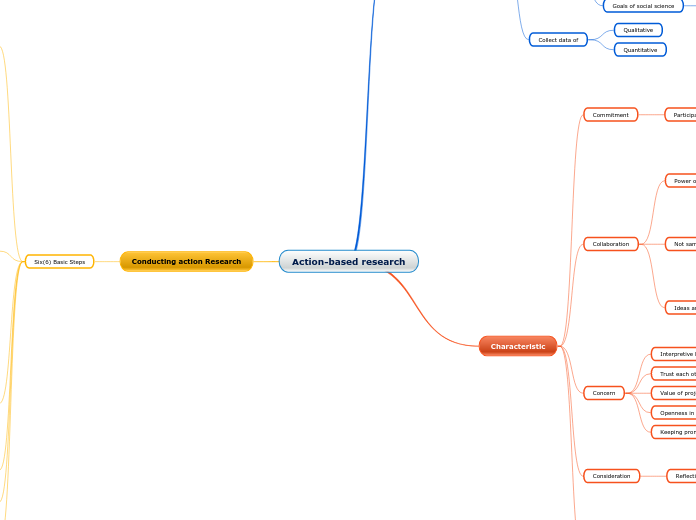Action-based research
What is Action research
Structured process where praticioners
Identify
Examine
Improve aspects
Use in real-time situation
Solving real-problem of their practices
Contribute
Practical concerns
Develop and improve practices
Educational
Increasing knowledge and improve practices
Goals of social science
Ethical framework
Collect data of
Qualitative
Quantitative
Characteristic
Commitment
Participants need time
Trust
Observe practices
Try new approaches
Collaboration
Power of relations
Equal among participants
Each person contributes ideas
Each person has a stake
Not same as compromise
Involve cyclical process
Sharing
Giving
Taking
Ideas and suggestion
Listened to
Reflect on
Respected
Concern
Interpretive Nature
Develop a support group
Critical friends
Trust each other
Value of project
Openness in communication with everyone
Keeping promises
Consideration
Reflective practice and review
Concentration and careful
Seek patterns
Generate meaning within the investigation
Change
Growing in developmental cycle of life
Ongoing
At times
Important elemets
Effective as an individual
Difficult
Subtopic
Conducting action Research
Six(6) Basic Steps
Identify a topic/issue to study
Important to the practicioners
Relevant to the professional lives
Topic can be refined by discussing with colleague or mentor
Conducting a literature review
Learn more about the topic
Provide ideas and strategies
Developing research questions
Relate directly to the identified topic
Keep research questions narrow in scope
Include intervention in the question
Implementation
Take action
Collect data related to the chosen topic/issue
Variety of data collection tools
Qualitative
Quantitative
Concept of Triangulation
Interview
Observation
Survey
Research ethics must be fully implements in the study
Spiraling Nature of data collection
Observes the setting
Participants(Looking)
Interprets and observations(Thinking)
Identifies a solution(Acting)
Analyse and interpret the data collection
Stop collecting data
Start analyzing when have reached data saturation
Make decisions for practitioner to understand and improve in the study
Goal of analysis is to interpret data
Report and share the findings/results
Verbally
Written
Take action based on the results
Implement the changes based on the results
Evaluate and reflect
Help to understand the new or needed methods
New questions
New forms
Deeper insights in practice
